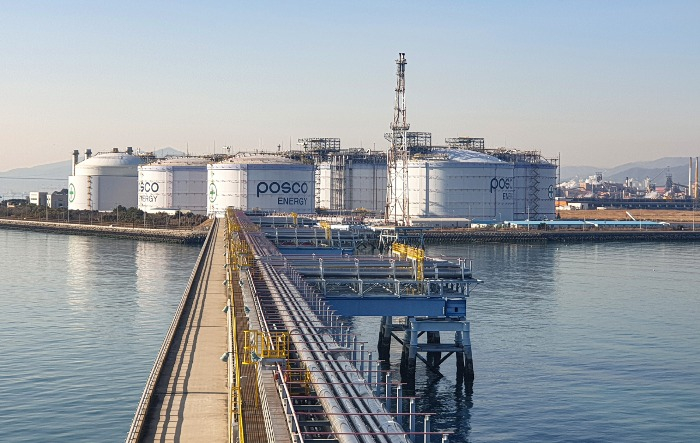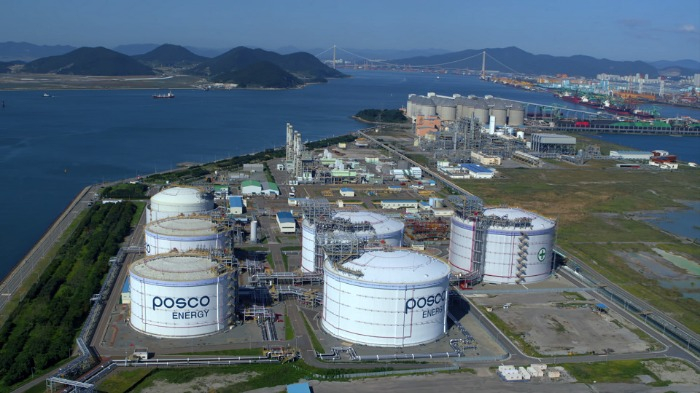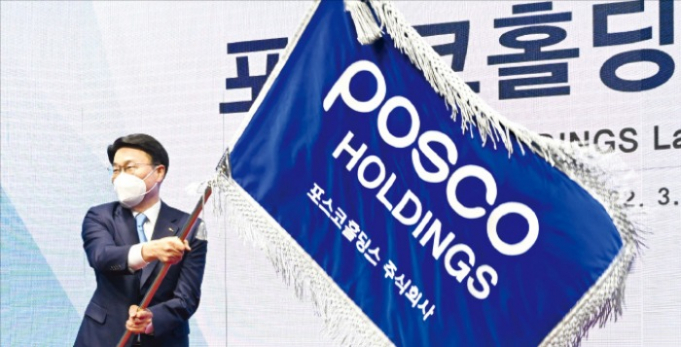Mergers & Acquisitions
POSCO Int'l tipped to merge with affiliated LNG terminal firm
POSCO Group seeks vertical integration of the LNG business upstream to downstream
By Jul 20, 2022 (Gmt+09:00)
3
Min read
Most Read
LG Chem to sell water filter business to Glenwood PE for $692 million


Kyobo Life poised to buy Japan’s SBI Group-owned savings bank


KT&G eyes overseas M&A after rejecting activist fund's offer


StockX in merger talks with Naver’s online reseller Kream


Mirae Asset to be named Korea Post’s core real estate fund operator



POSCO International Co., a South Korean trading company, has embarked on a merger with its affiliate POSCO Energy Co. as their parent group is seeking vertical integration of its liquefied natural gas (LNG) business upstream to downstream, according to sources familiar with the matter on Wednesday.
The combination of the companies is expected to help POSCO Group build the LNG supply chain from imports, liquefaction and storage to the distribution to final consumers.
POSCO International imports LNG, while POSCO Energy operates an LNG terminal, a facility for regasifying the liquefied fuel, in Gwangyang, 300 km south of Seoul.
The most likely scenario is that POSCO International will absorb unlisted POSCO Energy, the sources said.
Samil PwC Accountings is assessing both companies’ valuations to complete their merger by year’s end.
LNG was picked as POSCO’s bridge fuel to achieve net-zero emissions after POSCO Chief Executive Choi Jeong-woo took the reins of the steel giant late last year.
| Ownership structure of POSCO International and POSCO Energy | |
| POSCO International | POSCO Energy |
| POSCO Holdings (62.91%) | POSCO Holdings (89.02%) |
| National Pension Service (8.11%) | Treasury stock (10.98%) |
| Minority shareholders (29.06%) | |

VALUATION METHODS
A tricky issue for their combination is how to estimate their enterprise values and determine a merger ratio. A lower valuation for POSCO International could be met with a backlash from its minority shareholders with a combined 29.06% stake.
On the other hand, a higher valuation for the trading arm could dilute the value of POSCO Holdings Inc.’s 89.03% stake in POSCO Energy, upsetting shareholders of listed POSCO Holdings.
Neither company has yet decided on a valuation method.
RELATIVE VS. ABSOLUTE VALUATION
If the relative valuation model is employed, a merger ratio must be based on their market value, according to the South Korean Capital Market and Financial Investment Business Act.
However, if the market price falls short of their book value, they are allowed to switch to the book value to determine their merger ratio.
This valuation method references the price-to-earnings ratio, price-to-sales ratio and enterprise value against the EBITDA of peer companies in the same industry.
It is usually adopted by listed companies, or those which have received external funding based on their estimated valuation.
By comparison, the absolute valuation method applies a discount rate of projected future cash flow to estimate the current value.
Both valuation models could see pushback from investors.
Relative valuation leaves room for debate because the enterprise value depends on which peer group they are compared to.
Absolute valuation is also open to criticism in that it is based on estimated future cash flow.
Given that POSCO Energy is set to be absorbed into POSCO International, it is highly likely that their values would be based on discounted cash flow, or the absolute valuation method.

In the case of unlisted Dongwon Enterprise’s merger with Dongwon Industries Co. earlier this year, their merger ratio was initially set in accordance with market prices, which were below their book values.
However, in the face of strong opposition from Dongwon Industries’ minority shareholders, they shifted to the book value-based valuation.
Still, some of Dongwon Industries’ individual investors protested the merger and asked the company to buy back their shares.
Write to Jun-Ho Cha and Si-Eun Park at chacha@hankyung.com
Yeonhee Kim edited this article.
More to Read
-

-

-
 EnergyPOSCO to treble natural gas production in Australia by 2025
EnergyPOSCO to treble natural gas production in Australia by 2025Jun 17, 2022 (Gmt+09:00)
2 Min read
Comment 0
LOG IN


